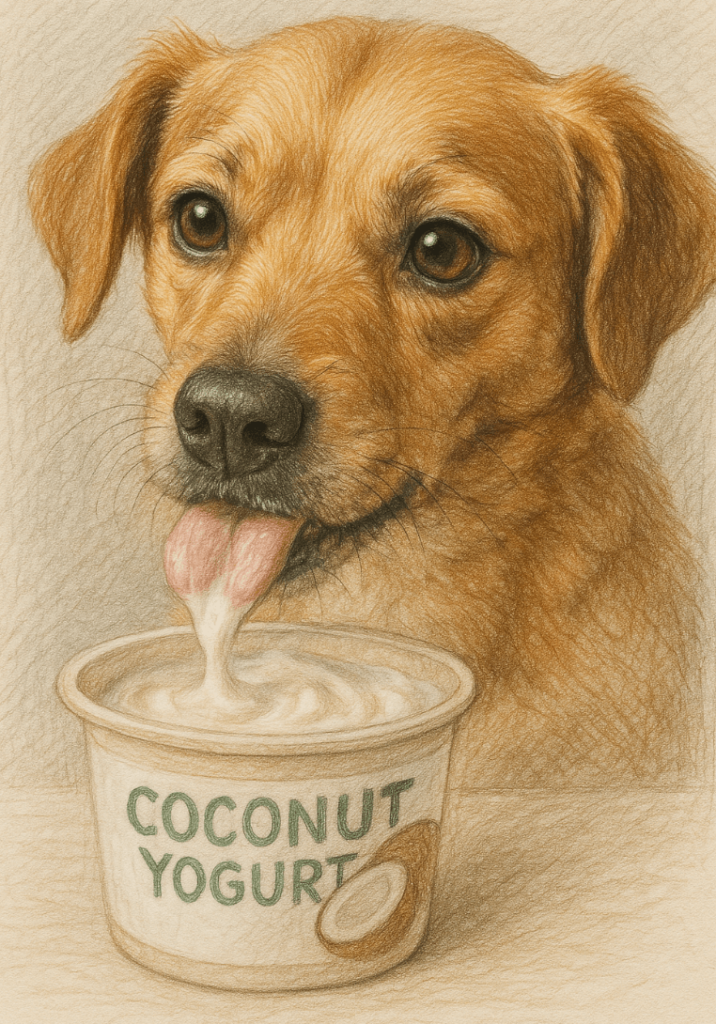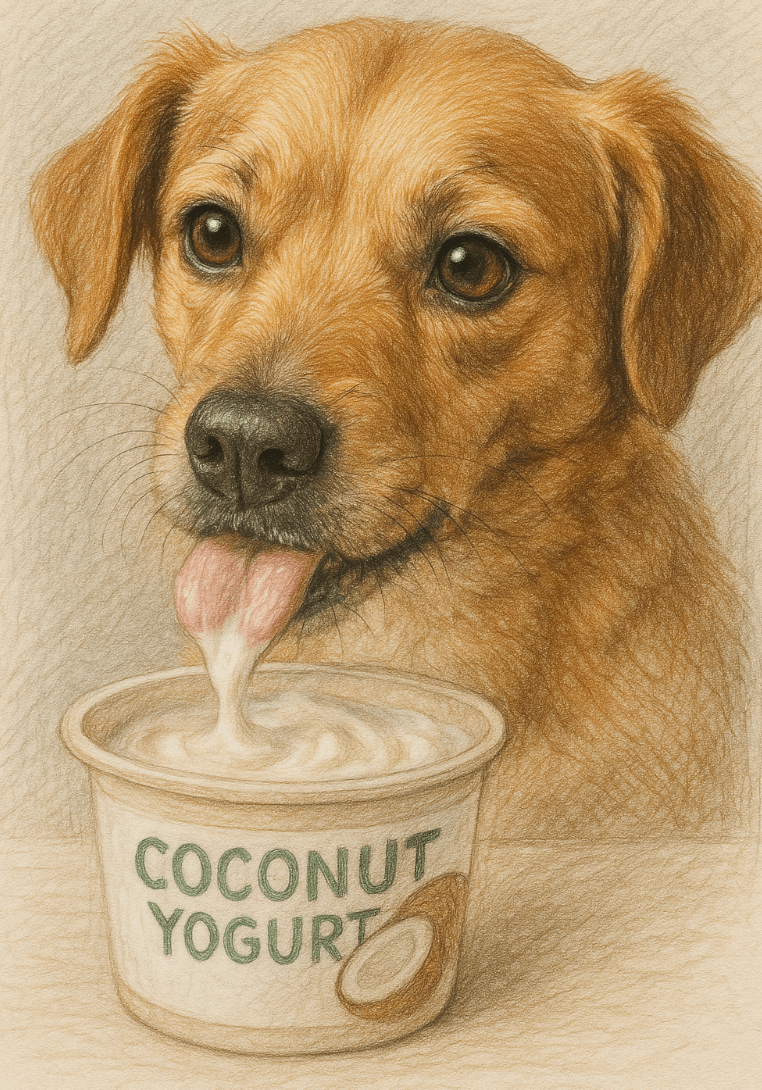Can Dogs Eat Coconut Yogurt? Everything You Need to Know
Coconut yogurt has gained popularity as a healthy, dairy-free alternative for humans, but can dogs enjoy this creamy treat too? Many pet owners are curious about incorporating coconut yogurt into their dog’s diet, whether as a tasty snack or a dietary supplement. While coconut yogurt offers potential health benefits for dogs, it’s important to understand its nutritional value, potential risks, and how to introduce it safely. In this blog post, we’ll explore everything you need to know about feeding coconut yogurt to your furry friend, ensuring they stay happy, healthy, and well-nourished.
Benefits of Feeding Coconut Yogurt to Dogs
When offered in moderation, coconut yogurt can provide several health benefits for dogs. Its natural ingredients make it a nutritious addition to their diet if introduced carefully.
Probiotics for Digestive Health:
Coconut yogurt contains probiotics that support gut health, aiding digestion and promoting a balanced microbiome.Rich in Medium-Chain Triglycerides (MCTs):
The MCTs in coconut oil and yogurt may boost energy levels and support brain function in dogs.Lactose-Free Option:
Unlike traditional dairy yogurt, coconut yogurt is lactose-free, making it easier to digest for dogs with sensitivities.Hydration Support:
The creamy texture of coconut yogurt can help keep your dog hydrated, especially when mixed with water or other wet foods.Natural Source of Vitamins and Minerals:
Coconut yogurt provides vitamins like B12 and minerals like calcium, which contribute to overall health and vitality.
These benefits make coconut yogurt a tempting treat, but always ensure it’s given in appropriate amounts to avoid any adverse effects.
Potential Risks of Feeding Coconut Yogurt to Dogs
While coconut yogurt can be beneficial, it’s not without risks. Being aware of these potential downsides helps you make an informed decision about including it in your dog’s diet.
High Fat Content:
Coconut yogurt contains saturated fats, which can lead to weight gain or pancreatitis if consumed excessively.Added Sugars or Flavors:
Many store-bought coconut yogurts include added sugars or artificial flavors, which can upset your dog’s stomach or harm their teeth.Allergic Reactions:
Although rare, some dogs may have allergies to coconut or its derivatives, causing symptoms like itching or digestive upset.Caloric Density:
Coconut yogurt is calorie-dense, so overfeeding can disrupt your dog’s balanced diet and lead to obesity.Unsuitable Brands:
Not all coconut yogurt products are safe for dogs; some may contain harmful additives like xylitol, a toxic sugar substitute.
Understanding these risks ensures you choose the right product and serve it responsibly.
Check this guide 👉Can Dogs Eat Great Northern Beans? Best 7 Expert Tips!
Check this guide 👉Can Dogs Have Palm Oil? Best 7 Expert Tips!
Check this guide 👉Can Dogs Eat Flaxseed? Best 7 Expert Tips!

Safe Ingredients in Coconut Yogurt | Risky Ingredients to Avoid |
|---|---|
Unsweetened, plain coconut yogurt | Added sugars or sweeteners |
Natural probiotics | Artificial flavors or colors |
Medium-chain triglycerides (MCTs) | Xylitol or other sugar substitutes |
Calcium and vitamin B12 | Preservatives like potassium sorbate |
Lactose-free formula | High-fat content beyond moderation |
How to Safely Introduce Coconut Yogurt to Your Dog
If you decide to give your dog coconut yogurt, proper introduction is key to ensuring their safety and enjoyment. Follow these steps for a smooth transition.
Start with Small Portions:
Begin with a teaspoon or less to see how your dog reacts before offering larger amounts.Choose Plain, Unsweetened Varieties:
Opt for coconut yogurt without added sugars, flavors, or artificial ingredients to minimize risks.Check for Allergies:
Monitor your dog for signs of allergic reactions, such as itching, swelling, or gastrointestinal upset.Mix with Familiar Foods:
Blend coconut yogurt with your dog’s regular food or mix it with water to create a hydrating treat.Limit Frequency:
Offer coconut yogurt as an occasional treat rather than a daily staple to prevent overconsumption.
By following these guidelines, you can safely incorporate coconut yogurt into your dog’s diet while minimizing potential risks.
Signs Your Dog May Have Eaten Too Much Coconut Yogurt
Even with careful portion control, accidents can happen. Watch for these warning signs if your dog consumes too much coconut yogurt or reacts poorly to it.
Diarrhea or Vomiting:
Excessive fat or unfamiliar ingredients can upset your dog’s digestive system, leading to loose stools or vomiting.Lethargy or Weakness:
A sudden lack of energy may indicate digestive distress or an allergic reaction.Pancreatitis Symptoms:
Signs include abdominal pain, vomiting, and loss of appetite, often caused by high-fat intake.Itching or Skin Irritation:
Allergic reactions may manifest as excessive scratching, redness, or swelling around the face.Excessive Thirst or Urination:
High sugar content in flavored varieties can affect hydration levels and kidney function.
Recognizing these symptoms early allows you to seek veterinary care promptly and prevent complications.
Common Mistakes to Avoid When Feeding Coconut Yogurt
Feeding coconut yogurt to your dog requires attention to detail to avoid mistakes that could harm their health. Here are some pitfalls to watch out for.
Choosing Sweetened Varieties:
Sweetened coconut yogurt can upset your dog’s stomach and harm their teeth—always opt for unsweetened options.Overfeeding:
Even healthy treats can cause problems if given in excess; stick to small portions.Ignoring Ingredient Labels:
Failing to check for harmful additives like xylitol can have serious consequences for your dog’s health.Assuming It’s Suitable for All Dogs:
Every dog is unique; what works for one may not work for another, especially if they have dietary restrictions.Skipping Vet Consultations:
Introducing new foods without professional advice can lead to unintended side effects or nutritional imbalances.
Avoiding these mistakes ensures a safer and healthier experience for your dog.
Alternative Treats for Dogs with Dietary Restrictions
If coconut yogurt isn’t suitable for your dog, there are plenty of other treats that cater to their dietary needs.
Plain Pumpkin Puree:
Rich in fiber, it supports digestion and is safe for most dogs when served plain and unsweetened.Carrot Sticks:
Low-calorie and crunchy, carrots are a great option for dogs who love chewing.Blueberries:
These antioxidant-rich berries make a sweet and nutritious snack in moderation.Unsweetened Applesauce:
A smooth and hydrating treat, applesauce is easy to digest and packed with vitamins.Cooked Green Beans:
Low in calories and high in nutrients, green beans are a filling and healthy option.
These alternatives allow you to cater to your dog’s preferences while keeping them safe and satisfied.
Fun Ways to Serve Coconut Yogurt to Your Dog
If your dog enjoys coconut yogurt, there are creative ways to incorporate it into their routine while keeping things exciting.
Frozen Yogurt Treats:
Pour small amounts of coconut yogurt into ice cube trays and freeze for a refreshing summer snack.Mixed with Kibble:
Drizzle a teaspoon of yogurt over dry food to enhance flavor and encourage picky eaters.Topped with Fresh Fruit:
Add a few blueberries or banana slices on top for extra nutrition and variety.DIY Pupcakes:
Use coconut yogurt as a base for homemade dog-friendly cupcakes, perfect for special occasions.Interactive Puzzle Toys:
Fill puzzle toys with coconut yogurt to combine mental stimulation with a tasty reward.
These ideas make feeding coconut yogurt a fun and engaging experience for your dog.
Frequently Asked Questions About Dogs and Coconut Yogurt
Is coconut yogurt safe for all dogs?
While most dogs tolerate it well, those with specific allergies or health conditions should avoid it unless approved by a vet.
How much coconut yogurt can I give my dog?
Stick to small portions—no more than 1-2 teaspoons for small dogs and 1-2 tablespoons for larger breeds.
Can puppies eat coconut yogurt?
Puppies have sensitive digestive systems, so consult your vet before introducing new foods like coconut yogurt.
What should I do if my dog has an allergic reaction?
Contact your veterinarian immediately and discontinue feeding the yogurt.
Are there alternatives to coconut yogurt for dogs?
Plain pumpkin puree, unsweetened applesauce, or plain Greek yogurt are excellent substitutes.
Feeding Coconut Yogurt to Your Dog: A Balanced Approach
Coconut yogurt can be a healthy and enjoyable treat for dogs when offered in moderation and selected carefully. Its probiotic content and nutrient profile make it a valuable addition to their diet, but its high fat and caloric density require caution. By understanding the benefits, risks, and proper serving methods, you can ensure your dog enjoys this creamy delight safely. Always prioritize your dog’s individual needs and consult your veterinarian before introducing new foods. With thoughtful care, coconut yogurt can become a delightful part of your dog’s menu.
Do Cats Have Taste Buds? Best 7 Expert Tips! – Discover how cats experience flavors and why their taste is so unique.
Do Dogs Have Taste Buds? Best 7 Expert Tips! – Discover how dogs experience taste, their preferences, and what it means for their diet and health.
Can Cats Taste Sweet? Best 7 Expert Tips! – Discover why cats can’t taste sweetness, how it affects their diet, and tips to keep them healthy and happy.
Can Dogs Taste Sweet? Best 7 Expert Tips! – Discover how dogs perceive sweetness, which foods are safe, and tips to manage their sweet cravings responsibly.





